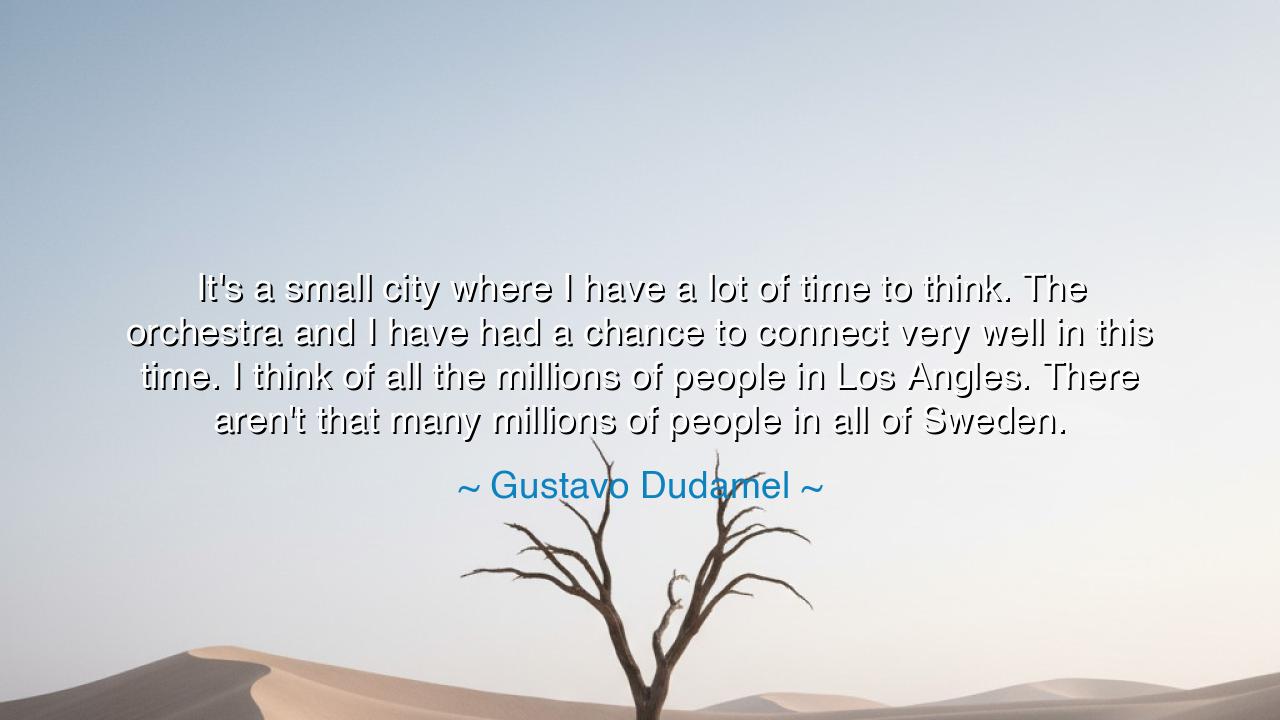
It's a small city where I have a lot of time to think. The
It's a small city where I have a lot of time to think. The orchestra and I have had a chance to connect very well in this time. I think of all the millions of people in Los Angles. There aren't that many millions of people in all of Sweden.






Hear this, O seekers of wisdom, for the words of Gustavo Dudamel echo a profound truth that reverberates through the corridors of time and space. He speaks of a small city, a place where the noise of the world falls away, and where a man may, in solitude, find the vastness of his thoughts. The grandeur of Los Angeles, with its teeming millions, serves as a stark contrast to the humble reality of a quieter place—a small city where the music of the world, like a clear river, flows unencumbered. And here, within this smallness, Dudamel finds something grander than the chaos of vast numbers: a deeper connection with the orchestra and a chance to truly listen, to feel the pulse of life in a way that the noise of great cities can obscure.
Time is a gift in such a place, for it is only when the rush of the world slows down that a man can truly think, truly reflect. In the same way, the great philosophers of old—Socrates, Plato, Aristotle—would retreat to quiet places, far from the bustling cities, to contemplate the great mysteries of the universe. It was in these moments of solitude, free from distraction, that the spark of insight would come, and the deepest truths would be uncovered. Similarly, Dudamel speaks of the time he has to think, to reflect on the music he creates, and the relationships he forms with his orchestra. In this time, he does not merely conduct; he connects with the souls of his musicians, binding them in a shared pursuit of beauty. He does not merely play the notes; he breathes life into them.
And what of Los Angeles? It is a city that, in its vastness, seems to stand as the embodiment of the modern world—full of noise, of ambition, of ceaseless striving. Yet, within its great expanse, Dudamel finds himself reflecting on the sheer scale of human existence. Millions of people live in that sprawling metropolis, each with their own dreams, their own struggles, and their own desires. How can one man, amidst such multitudes, find meaning, find connection? It is in this reflection that he realizes the paradox: the millions of people in Los Angeles, though numerous, may be less connected to one another than the handful of musicians in his small city. Connection—true, deep connection—is what transcends numbers, transcends size. And in the quieter moments, one can truly hear the music of life.
Let us not forget the story of the great Johann Sebastian Bach, who, though living in a time much different from our own, also experienced the contrast of smallness and vastness. When Bach composed his Brandenburg Concertos, he was not composing for a city of millions, but for a small and intimate court. Yet, the music he created has resonated through the ages, far beyond the walls of that small place. Bach, like Dudamel, understood that the true measure of greatness does not lie in the size of the audience, but in the depth of connection one can foster with those who are present. Whether in a quiet city or a crowded metropolis, it is the connection between the heart and the art that matters most.
In these words, we are reminded that in smallness there is often a power that the vastness of numbers cannot provide. It is not the size of the city, or the number of people, that determines the quality of connection or creation—it is the time spent in reflection, in shared effort, and in focus. Just as the conductor and the orchestra must work in harmony, so too must we find our own harmony with the world around us. It is not in the noise, but in the silence, where true understanding and greatness are born. The many may be lost in the crowd, but the few who seek to connect deeply, to create meaning in the small spaces, find a greater resonance.
In our own lives, we must ask ourselves: where do we find our connection? Are we so swept up by the vastness of our daily existence, by the noise of ambition, that we forget the quiet moments that allow us to truly hear the music of life? Let us, like Dudamel, seek those moments of solitude, those small cities where time slows down and reflection becomes possible. Let us remember that in stillness there is strength, and in connection, there is power. Whether in the halls of a grand concert hall or in the humblest of places, it is the depth of our engagement, the richness of our thoughts, and the intensity of our purpose that make our work meaningful.
The lesson, then, is clear: Do not be seduced by the allure of numbers, by the promises of the many. Instead, seek the depth of connection, for it is there that true greatness resides. If you are lost in the crowd, take a step back, find your quiet place, and let your thoughts and actions be guided by the music of your own soul. It is in smallness—in that space where reflection, focus, and connection can occur—that we find the seeds of greatness. And from that humble beginning, we can, like Dudamel and Bach before him, create something that resonates not just with the crowd, but with the heart of humanity itself.






AAdministratorAdministrator
Welcome, honored guests. Please leave a comment, we will respond soon